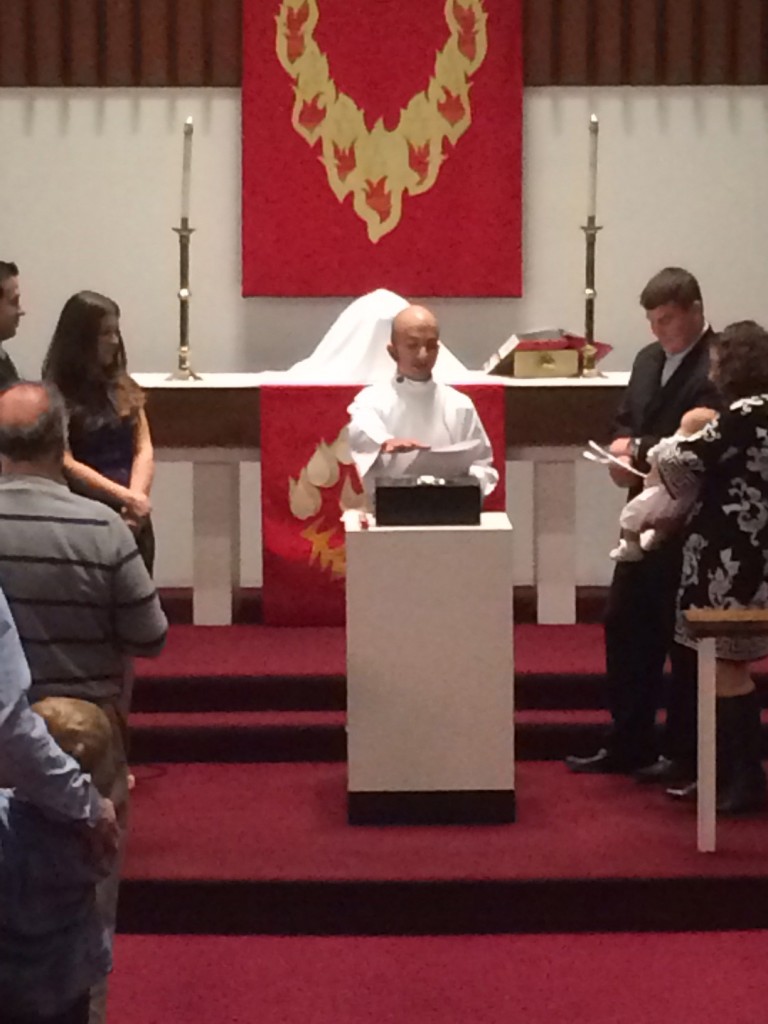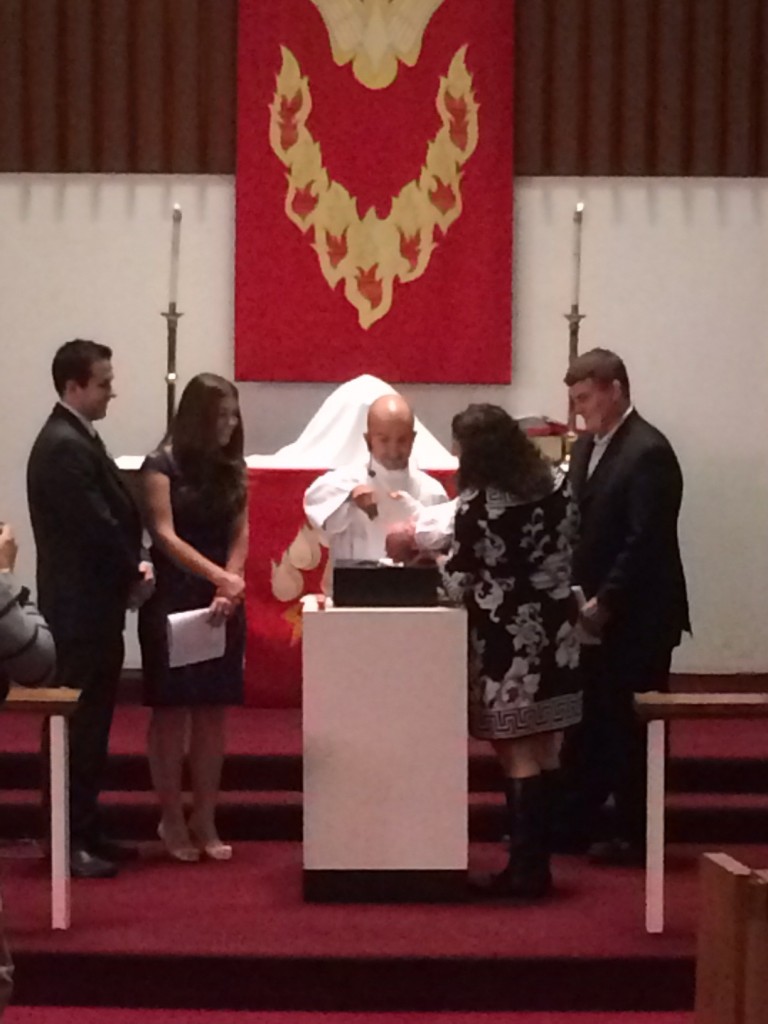“For it is as if a man, going on a journey, summoned his slaves and entrusted his property to them; to one he gave five talents, to another two, to another one, to each according to his ability. Then he went away. The one who had received the five talents went off at once and traded with them, and made five more talents. In the same way, the one who had the two talents made two more talents. But the one who had received the one talent went off and dug a hole in the ground and hid his master’s money. After a long time the master of those slaves came and settled accounts with them. Then the one who had received the five talents came forward, bringing five more talents, saying, ‘Master, you handed over to me five talents; see, I have made five more talents.’ His master said to him, ‘Well done, good and trustworthy slave; you have been trustworthy in a few things, I will put you in charge of many things; enter into the joy of your master.’ And the one with the two talents also came forward, saying, ‘Master, you handed over to me two talents; see, I have made two more talents.’ His master said to him, ‘Well done, good and trustworthy slave; you have been trustworthy in a few things, I will put you in charge of many things; enter into the joy of your master.’ Then the one who had received the one talent also came forward, saying, ‘Master, I knew that you were a harsh man, reaping where you did not sow, and gathering where you did not scatter seed; so I was afraid, and I went and hid your talent in the ground. Here you have what is yours.’ But his master replied, ‘You wicked and lazy slave! You knew, did you, that I reap where I did not sow, and gather where I did not scatter? Then you ought to have invested my money with the bankers, and on my return I would have received what was my own with interest. So take the talent from him, and give it to the one with the ten talents. For to all those who have, more will be given, and they will have an abundance; but from those who have nothing, even what they have will be taken away. As for this worthless slave, throw him into the outer darkness, where there will be weeping and gnashing of teeth.’
Matthew 25:14-30
My sermon from 23rd Sunday after Pentecost (November 16, 2014) on Matthew 25:14-30. Listen to the recording at the bottom of the page or read my manuscript below.
****************************
Living in New York City, I didn’t see a lot of fall leaves. When fall came, I’d spot a few trees along the street turning red and gold, and I knew that their leaves would fall, but I rarely ever saw them fall. I didn’t get that crunch-crunch-crunch sound from walking in leaves because – as those leaves fell, the super of the building would come out, sweep them into the street, and that would be it.
Now that I’m living here in New Jersey, I have the exact opposite experience. There’s an amazing number of beautiful trees, gold, red, orange – and they all decided this week that they were just going to give up. There are leaves everywhere. I can watch them fall outside my window, they land on me when I go outside, and instead of just crunch-crunch-crunch, I’m slipping on them as I try to go up and down stairs. The world is buried by an abundance of leaves. So, yesterday, as I raked an incredible amount of yellow and gold leaves into a giant pile, I had this parable from Matthew stuck in my mind. As the pile grew so big that I could be practically lost in it, it reminded me of an image I grew up with and still see from time to time on TV and cartoons – and that’s Scrooge McDuck’s swimming pool. I mean, when I imagine what an abundant amount of wealth and money looks like – a swimming pool filled with gold, jewels, and cash is totally it.
But our parable today is about more than just money or being rich. This parable is about the concept of abundance – and just how to reframe ourselves so that we act, breathe, and live through the reality of God’s abundance in our lives – even though that abundance can be very, very, hard to see.
So Jesus starts this parable in an interesting way. He doesn’t talk about the Kingdom of Heaven or the Kingdom of God – no, he’s instead building on what we heard last week – the parable of the bridesmaids with lamps and the final words from Jesus that we are called to “keep awake.” But instead of bridesmaids this week, we have a rich man, a journey, three slaves, and what happens when that rich man gives his slaves an incredible sum of money to watch over while he’s gone.
Now, we need to realize that when we hear the word “talent,” we’re not talking about an ability. The rich man doesn’t give one of his slaves five skills – like making him an incredible dancer or cook. No, a talent is an actual measure of wealth. So, for those of us who get a paycheck, social security, or maybe just an allowance, imagine if you reached into your pocket and found a roll of cash with 20 years of your wages on it. That’s one talent. So this rich man is about to take a journey and he gives one of his slaves 5 talents, another 2 talents, and the other 1. He’s giving away 100 years of wages, 40 years of wages, and then 20 years of wages. That’s how much money this guy has and he gives it to these three slaves with no instructions, no rules, no requirements. He just gives it away, leaves, and lets the slaves do what they wish.
Now what would you do if you suddenly had 100 years of wages in your hand right now?
Well, the first two slaves get busy. They go out, wheel and deal, and double their money. The slave with 100 years worth of money now has 200 and the slave with 40 now has 80. But the third one does something very different – he takes that money and buries it. Now, that might seem odd to us but burying money was something people did in Jesus’ time. That slave took the money and buried it to protect it so that none of it would be lost. He was given twenty years of wages and did nothing with it but he didn’t lose it.
So the rich man comes back and he asks his slaves what happened to the wealth he gave them. The first and second slave tell the rich man that they doubled his money and this makes the rich happy. He’s promises each slave that he’ll give them more responsibility, more wealth, more power in the future.
But the slave who hid that talent comes forward and, maybe noticing that the other two doubled their money, he begins to explain himself. Now, his explanation might seem a little odd to us – but it makes sense in his context. In Jesus’ time, it was believed that there was a finite and static amount of wealth in the world. If you made money, you had to have taken it from someone else. For this rich man to have his own swimming pool of gold and money, he must have taken all that money and gold from someone else. You only get wealthy if someone else gets poorer. And so this slave, thinking this way, was afraid. The rich man got wealthy by taking from others – and this slave was afraid of what would happened if he ended up with no money left – if he ended up making someone else richer and the rich man poorer. So the slave played it safe and brought back the talent to this rich man.
And then the rich man does something strange. He gets mad.
We need to be careful at this point to not focus too much on the success of the other two slaves. Sure, they doubled their money and the rich man seems happy about that – but that rich man gets angry with his third slave not over money but because of the slave’s inaction.
If we go back to the start of the parable, we see that each slave was given a certain amount of wealth according to their ability. The rich man doesn’t need more money. He’s going on a trip – and his slaves don’t even think about taking his money or running away or buying their freedom and no longer being slaves. This rich man is so comfortable in his position of authority and power, that more money, more wealth, won’t change who he is or what he can do. Instead, he gives out of his abundance to these slaves and gives them no instructions. Instead, he portions out the wealth in the amounts that he knows they could do something with. So when the rich man looks at that third slave and gets angry – he even tells the slave that the least he could have done was do something that writings in the Old Testament are very much against – and that’s put the money in the bank to get interest.
Now, this isn’t a parable about money or our material wealth. This is a parable about living out of a place of abundance. That third slave was locked in a mindset of scarcity. He was worried about what would happen when he lost it all. But the rich man didn’t need more money and the slaves didn’t need more money either. Money isn’t what defined them because money wasn’t really what they were given. What they were given was abundance – and they were challenged to live out of that abundance rather than out of their fear of losing it.
That challenge – to live out of a sense of abundance – that was difficult in Jesus’ time and it’s difficult in ours too. Turn on the tv to BBC America and watch an episode of Top Gear – and we’ll see an amazing car that we might never be able to afford. Open our mail and there might be a medical expense, some credit card debt, a student loan payment, or another reminder that we’re not as abundant as we’d like. And isn’t there always another thing on our unending to-do list? Another kid to pick up, homework to turn in, project to finish, errand to run, or challenge to overcome. Time and money, these define our sense of abundance. We’ve got too much to do, not enough time to do it, and not enough money to really live the life we expect.
Scarcity can feel very much like a squeezing – like trying to tread water during a tropical storm. The instinct is to turn inward, to conserve, to draw our arms tight around ourselves and push everyone out. The fear of being swamped by one more wave – one more bill – one more unexpected experience – turns us to just go ahead and protect ourselves. We bury our ability to take risks, our ability to change, our willingness to try something we haven’t tried before because we’re too busy trying to not lose what we have around us.
But that’s not what God has in mind for us.
This text isn’t about scaring us – this text is about giving shape to where the Christian life begins which is firmly in the one who, when nailed to the Cross, looked like the complete opposite of abundance – the opposite of security – he was the pure essence of scarcity – abandoned by his friends, arrested and tortured by the ones who occupied his homeland, and he felt completely abandoned by the God of us all – the Christian life begins there – in the one who was broken but who was about to do a very brand new thing. The text isn’t telling us to be afraid of brokenness or to never be afraid at all. We’re human – we’re going to feel fear – we’re going to be scared – but fear, failure and scarcity doesn’t define us. Fear, failure, and scarcity doesn’t make us who we are. And we shouldn’t let those limit whose we are.
[9:00 AM
So, if we take that jump and try to live out of a sense of abundance – what would that actually look like? One way might be is to talk about the gifts that God gives us – those talents or abilities we have that others don’t – and that we should use those to further God’s kingdom in the world. But I’m not convinced that’s what Jesus is doing here. I don’t think Jesus is talking about abilities and skills or even money – Jesus, instead, is challenging that underlying sense of scarcity that turns us inwards, keeps our eyes firmly on ourselves. We don’t see our friend in need because we don’t have time to give them a call. We don’t see our family in distress because we’re too busy driving to the next event, to that next thing. We don’t see the stranger suffering because we’re just so tired that trying to get to know someone new is just something we can’t do. But that’s what a vision of scarcity does. And the truth is that we’re not living a life in scarcity because we’ve been brought into the life of the one who can only be abundant. Brokenness doesn’t define us – Resurrection does. The invitation, then, is to live that Resurrection out – to reach out to that friend, to take a breath and look, really look, at our spouse, child, brother, or sister – and to learn the name of the person sitting next to you – to be abundant in the face of scarcity because, like the leaves outside, piled in the street, in our yards, and on our cars – we are claimed by that God whose love for us, for our friends, for our neighbors, and for the entire world is abundantly boundless.
Amen. ]
[10:30 AM baptism
In a minute, we’re going to get a little abundant in our life together here at Christ Lutheran Church. I’m going to invite Jackson to come on up here with his family and sponsors and we’re going to baptize him. We’re going to bear public witness to God’s love of Jackson, God’s claiming of Jackson, God’s promise to make Jackson brand new. And we’re going to do it in a very scarce way. We’ll use only a few words – only a few prayers – and we’ll only use a little bit of water in our small font. Yet, in these very small and ordinary things, we’re going to live abundantly. We’re going to hear God’s promise to Jackson to always be by his side. We’re going to hear about God’s promise to lead the son Jackson to the Son on the Cross. We’re going to hear about God’s promise to love Jackson not because Jackson will always be perfect but because God’s promises are. We’re going to proclaim that God’s abundant care for this world is going to be shown in this little bit of water, this little bit of words, and this little human being. We’re going to show that abundance isn’t defined by quantity – it isn’t defined by absurd numbers or extravagance. No, the abundance that we proclaim, the abundance that we live into, the abundance that feeds us, nourishes us, and changes us – that’s God’s abundance.
We’re invited to continue to live out that sense of abundance. We’re called to not let scarcity define us. We’re told to not conserve but to share, not to hold back but to proclaim, not to retreat but to go out, to meet our neighbors in Woodcliff Lake, Hillsdale, Park Ridge, and beyond – to know them – know their communities – know their needs, hopes, wants, troubles, sorrows, and joys – and to live abundantly with them not because we’re perfect or because we’re fearless or because we’re always going to double our money and never fail. No, we live abundantly because, like the leaves outside that are piled in the street, in our yards, and on our cars – we are claimed by that God whose love for us, for our friends, for our neighbors, and for the entire world is completely, 100%, totally boundless. To love – that’s our invitation, that’s our calling, and Jackson – that’s your calling too. We welcome you to a new experience and a new life that calls all of us to be, do, and explore the world as abundantly brand new.
Amen. ]
Podcast: Play in new window | Download



